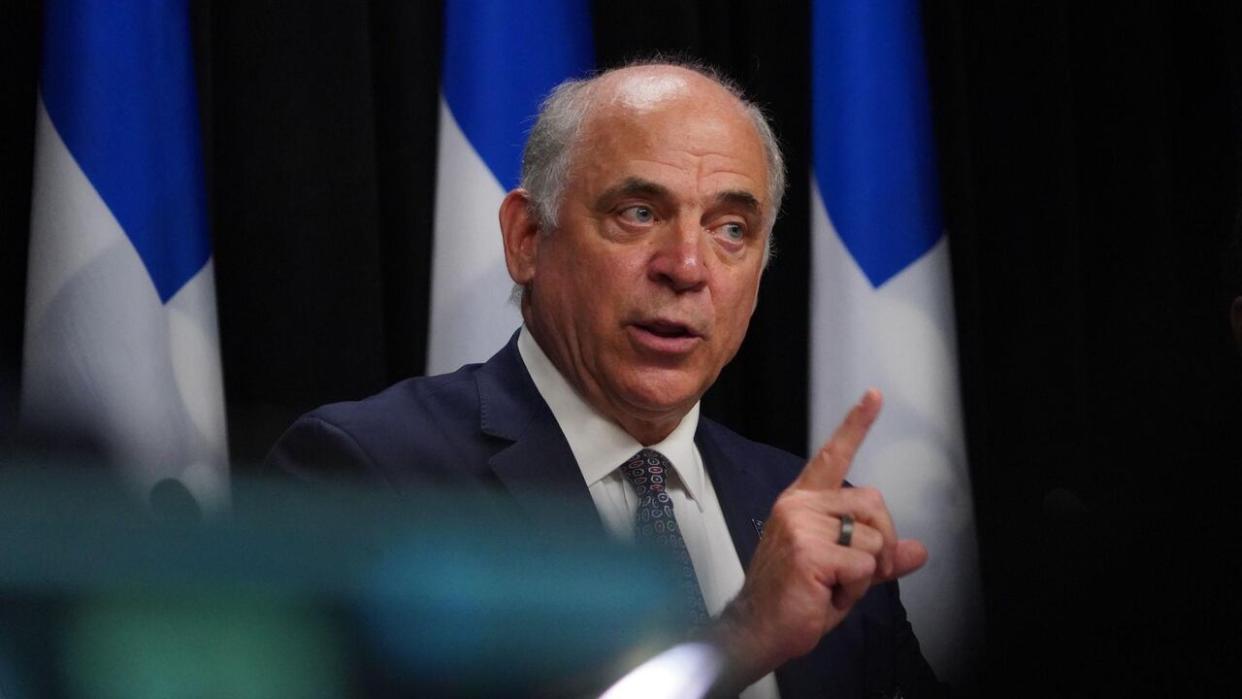Energy minister tables bill to speed up Hydro-Québec's green power production

Quebec Energy Minister Pierre Fitzgibbon tabled a lengthy bill Thursday to push forward the Legault government's energy production goals.
At 56 pages, Bill 69 — An Act to ensure the responsible governance of energy resources and to amend various legislative provisions — lays the foundation for an integrated energy resources management plan, as the province works toward achieving carbon neutrality by 2050.
Fitzgibbon said at a news conference Thursday that "the purpose of the law is not to tell Quebecers where we're going to put a dam or where we're going to put wind farms," but to accelerate production of green energy.
"Current processes are too slow, and projects are not being completed quickly enough," he said. "There is no question that Quebec will lose its competitive advantage in relation to clean energy."
He said the management plan will set the stage for a discussion over how Quebecers want to decarbonize and who will be responsible for paying.
Bill 69 would remove the requirement for Hydro-Québec to make calls for tenders, which in turn, Fitzgibbon says, would allow the Crown corporation to speed up green energy projects, such as electric "highways," wind projects and new hydroelectric power stations.
"We have to develop, in 25 years, electricity that Quebec took 100 years to build," Fitzgibbon told reporters Thursday.
Quebec's energy regulator, the Régie de l'énergie, could also see its mandate change. The bill would make the Régie responsible for reassessing the electricity rates of residential, commercial and industrial customers every three years rather than every five years, as is the case currently.
The Régie would also have the ability to set one or more rates for Hydro-Québec residential customers, to incentivize reducing electricity consumption during peak periods.
Although some dynamic pricing programs already exist, they are optional for customers.
Fitzgibbon said that, for now, there are no plans to make dynamic pricing mandatory.
Additionally, the bill would authorize anyone producing electricity from a renewable source to distribute it to a single customer.
That would allow industrial companies to buy renewable energy directly from a private source — without going through Hydro-Québec's network — so long as the installations are adjacent to each other. Until now, that exception only applied to biomass power.
Fund to keep electricity affordable
Domestic distribution rate increases are currently capped at three per cent until 2026. Those are set by the Régie and are based on the costs of Hydro-Québec to build and maintain its network.
Fitzgibbon said he couldn't guarantee that the limit would remain. But Bill 69 does propose a financial assistance program to help residential customers afford increasing electricity rates.
The Fonds d'aide à la clientèle domestique d'Hydro-Québec would ensure that prices for residential clients are kept below a three per cent rate increase for an indefinite period, as Premier François Legault promised last fall, without affecting Hydro-Québec's revenue. Costs exceeding the cap would be covered by the program.
But the amount the Crown corporation charges its commercial and industrial clients might increase more quickly, since the company needs to finance its $185-billion action plan to transform Quebec's energy landscape by 2035.
Businesses concerned about electricity tariffs
Hydro-Québec welcomed the bill for giving it a "central role" in the energy resources management plan, but some businesses expressed concern over heightened electricity costs.
Conseil du patronat du Québec (CPQ) president Karl Blackburn said in a statement published Thursday that the bill would allow the business community to anticipate Quebec's energy capacity and make strategic decisions that align with it. But the CPQ statement also called for the price of electricity to stay "sufficiently competitive."
Echoing those views, François Vincent, vice-president of the Fédération canadienne de l'entreprise indépendante (FCEI) — a non-profit that advocates for small businesses — said Thursday that electricity rates for small businesses are on average 18 per cent to 28 per cent more expensive than the costs actually incurred to serve them.
"Everything indicates that SMEs will remain Hydro-Québec's cash cows and will be under significant pressure to increase their costs due to major investment plans," he said in a statement.
"The fact remains that with Bill 69, there is a long way to go and MNAs can continue to improve it before its adoption."

 Yahoo News
Yahoo News 
